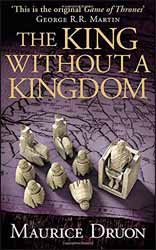|
Click here to return to the main site. Book Review
The King Without a Kingdom (2015. 346 pages) is the seventh and last novel from the influential French historical novelist, Maurice Druon, detailing the fall of the Capetian kings of France, which in a short historical period saw France transform from a preeminent power to one which undertook the Hundred Years War against England, under the guidance of its less than regal monarch, John II. The book's structure is a little unusual in a modern novel. The whole thing is constructed as a monologue between Cardinal Périgord, his nephew and others as they travel across France. Although the Cardinal recounts all the follies of John as a king, everything we are able to see or learn is restricted to the Cardinal's point of view. This choice of structure may seem a little dry for some readers. The book, in its eleven chapters, recounts the last days of the Capetian line of kings, which had been so disastrous for the country and the final rise of a new dynasty with the Valois. Of course, as the Cardinal is the one recounting the events, he spares little time in elevating his own role in history, whilst simultaneously point out all the faults he can find in others. By his own actions he comes over as insipid and vainglorious. We learn little of his passengers who have to listen to him, like the reader they are expected only to act as the passive recipient. In between his boasting he is able to recount the failings of the king which led to the commencement of the Hundred Years War, as well as the other disasters visited on France like the plague and incursions from other princes. As the king starts to lose his authority, competing factions in the kingdom start to tear it apart. Whilst the book is stylistically very different to the previous six, swapping the omniscient writer for a single point of view, the thing which will please fans of the series is that this is the volume which had previously been translated into English. It’s odd because of the change in style the book does not feel like it naturally fits with the previous six, where we were allowed into the centre of the action. Here we are very much sidelined observers and for this reason I do not think the book works as well as the others. It does finish off the story satisfactorily, but only through the eyes of a boastfully unreliable witness. 6 Charles Packer Buy this item online
|
|---|


